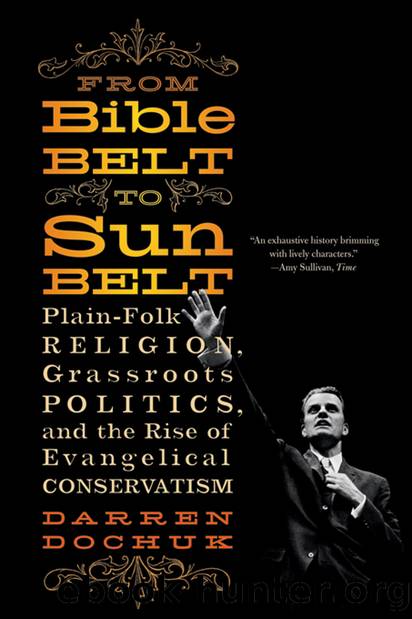From Bible Belt to Sunbelt by Darren Dochuk

Author:Darren Dochuk
Language: eng
Format: epub
Publisher: W. W. Norton & Company
Published: 2011-07-14T16:00:00+00:00
“IN YOUR HEART YOU KNOW HE’S RIGHT”
“In Your Heart You Know He’s Right” was the motto Goldwater’s handlers chose to galvanize people in 1964, and though opponents ridiculed it, the slogan proved effective in channeling a “born again” religious zeal into their political movement. More importantly for Goldwater’s team, it became a winning formula, at least during the summer months, when their campaign and the Proposition 14 crusade went into high gear.
Goldwater’s first major hurdle was the Republican primaries. Since the late 1950s, evangelicals in California had been enthusiastic about the possibility of a Goldwater ticket. By the mid-1960s, the Arizona senator’s handlers were taking notice. Having gained credibility through radio programs, newsletters, speaking appearances at freedom forums and anti-communist rallies, and the Becker Amendment, Clarence Manion and other Goldwater advisors easily convinced electoral precincts to incorporate churches in their local publicity and registration drives. Parachurch ministries like Campus Crusade for Christ, which had the ear of young Christian conservatives on California’s college campuses, also now gained the notice and approval of Goldwater’s campaign managers.38
In truth, evangelicals hardly needed to be told what to do. In the weeks leading up to the June 2 California primary, both Goldwater and his opponent, Nelson Rockefeller, stepped up the urgency of their campaigns. Evangelicals responded accordingly. Writers and publishers like Weniger and preachers like Wells and LaHaye hammered home the idea that voting Goldwater was a Christian requisite. By late May members of Central Baptist and Scott Memorial Church already seemed convinced and went out into the streets to spread the word. Many brought the official “Californians for Goldwater” pamphlet, which summarized Goldwater’s politics in two pages, and devoted a third to his personal traits; Goldwater was “An Outstanding Man; A Real Man; A Different Man; A Courageous Man; A Fighting Man; A Party Man; A Dynamic Man; An All-American Man.” Precincts handed out “Footsoldier Program Instructions” telling workers not to be too aggressive when knocking on neighbors’ doors, but many were already well versed in such witnessing strategies.39
Regardless of their prior experience in door-to-door fieldwork, these activists treated their proselytizing as if there was much more than an election on the line. In Pasadena, Marie Koenig (formerly King), now a busy mother, committed significant portions of her week to clipping articles from newspapers and making a case for Goldwater—both privately, in conversations with family, friends, and neighbors, and publicly, at the Lutheran (Missouri Synod) Church to which she and her husband now belonged. As she had been for Huey Long in Louisiana, Koenig was completely devoted to her politician. Helen Young’s heritage, too, was now refracted through her activism. Like her mother, who had coordinated political campaigns in Oklahoma City, Young was compelled to make her political convictions count. By virtue of her status as President Norvel Young’s spouse and one of Pepperdine College’s ambassadors to the conservative elite, she attended the same Republican women’s meetings that Koenig attended. Because she shouldered heavier religious responsibilities, she did not match Koenig’s political drive, but she was every bit as dedicated to their collective cause.
Download
This site does not store any files on its server. We only index and link to content provided by other sites. Please contact the content providers to delete copyright contents if any and email us, we'll remove relevant links or contents immediately.
| Anarchism | Communism & Socialism |
| Conservatism & Liberalism | Democracy |
| Fascism | Libertarianism |
| Nationalism | Radicalism |
| Utopian |
The Secret History by Donna Tartt(16627)
The Social Justice Warrior Handbook by Lisa De Pasquale(11489)
Thirteen Reasons Why by Jay Asher(7788)
This Is How You Lose Her by Junot Diaz(5775)
Weapons of Math Destruction by Cathy O'Neil(5038)
Zero to One by Peter Thiel(4824)
The Myth of the Strong Leader by Archie Brown(4789)
Promise Me, Dad by Joe Biden(4449)
Beartown by Fredrik Backman(4420)
Stone's Rules by Roger Stone(4417)
How Democracies Die by Steven Levitsky & Daniel Ziblatt(4399)
The Fire Next Time by James Baldwin(4343)
100 Deadly Skills by Clint Emerson(4079)
A Higher Loyalty: Truth, Lies, and Leadership by James Comey(4033)
Rise and Kill First by Ronen Bergman(4012)
The David Icke Guide to the Global Conspiracy (and how to end it) by David Icke(3883)
The Farm by Tom Rob Smith(3872)
Secrecy World by Jake Bernstein(3783)
The Doomsday Machine by Daniel Ellsberg(3732)
